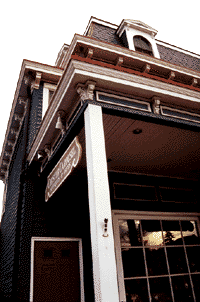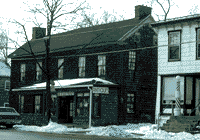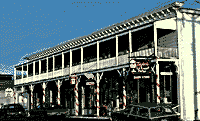
Like
many Skylands communities, Chester's roots pre-date Colonial times. The
native Lenni-Lenape paths along the Black River were the initial generation
of trails along which white settlers later established farms, mills,
blacksmith shops and cabinet shops.
The place where two of these "great roads" crossed was by 1740 known
as Black River, home to a population dedicated mainly to agriculture.
By 1771 a weekly stage wagon route extended from Jersey City to the Crossroads.
In the early 1800s the new and improved Washington Turnpike (now Route
24) was chartered to run through what had become known as Chester, and
the town soon became home to the "Brick Hotel", a succession of taverns
and an expanding Main Street economy.
This embryonic tourist trade was profitable until the 1830s when overland roads were improved to the extent that fewer stopovers during long journeys were required, and much of the era's commercial freight had begun to float along the Morris Canal.
In 1867, when a "limitless" line of iron ore was discovered along the north side of Main Street, Chester became a boom town. Iron brought a furnace, railroads, dandy personalities and a Golden Age of carriages and servants to a generation of Chesterites. The town joined many of its neighbors in making Morris County the third largest producer of iron ore in the nation by 1880. But the bust side of the boom raised an ominous shadow when the infinite ore vein disappeared, and Chester entered the final "ghost town" phase of the mineral rush cycle a mere 25 years after it began.
A relatively sluggish Chester emerged at the turn of the Century; one with memories of opulence fading back to the tranquil economy of the countryside. The deserted village still held a core of tenacious business people who succeeded in attracting a few manufacturers to town. But the town's celebrity began to blur in the face of encroaching suburbanization.


The sparks that turned Chester back to doing serious business with visitors began in the 1950s and 60s. The Crossroads had been moved west a quarter of a mile or so with the cutting of Route 206. From that intersection the owners of Larison's Turkey Farm Inn had undertaken an advertising campaign in nearly every ethnic newspaper in the metropolitan area to bring travelers to dine in one of the oldest buildings in Chester. Come they did; and return they did. The Brick Hotel on Main Street had become the Chester House, attracting hundreds of travelers from New York and Philadelphia each Sunday for duck dinners. In 1969 the Chester Lions Club opened a flea market in town; one whose phenomenol growth would continue to the present day. The Crossroads was alive and well.
In the early 1970's the first "shops for visitors" opened- The Emporium, Academy Awards, and Taylor's Ice Cream Parlor. Chester's shopping environment- streets lined with buildings representing phases of history from the early 1700's- couldn't have been better planned by Disney himself. And the gracious fact that these glorious remnants still stood was almost as earth-shattering as the discovery of a vein of ore.
The visitor is vital, interesting, refreshing and valuable to Chester's shop-keepers. And they know that the visitor is interested in more than 200 year-old headboards. You can get about anything you want in Chester from gourmet coffee to state-of-the-art stereo.
In Chester's case economic pressures have kept history alive. The buildings on Main Street are a large part of what brings visitors to discover a great contemporary shopping experience.
For information about Chester, contact theHistoric Chester Business Association (HCBA), local merchants who are committed to the quality of the community and who are a major force in the structuring of events that take place in Chester throughout the year. The Association's members cover all types of retail, dining and service related businesses. The HCBA publishes an annual Shopping and Dining Guide listing valuable information about its member shops and annual events.
To acquaint visitors, the Chester Historical Society has published several interesting reference books: Chester, NJ A Scrapbook of History by Frances Greenidge based on research by long time resident Edwin Collis and her own interviews. Chester's Iron Heyday, by Larry Lowenthal, is an authoritative study of the 20 years when iron was being mined along Main Street and in the Hacklebarney area. There is a walking tour guide, A Stroll Through The Old Village of Chester and a one-hour video of the same title. Most recently, the Society has published an auto tour guide.
The Millstone Scenic Byway includes eight historic districts along the D&R Canal, an oasis of preserved land, outdoor recreation areas in southern Somerset County
Dedicated to preserving the heritage and history of the railroads of New Jersey through the restoration, preservation, interpretation and operation of historic railroad equipment and artifacts, the museum is open Sundays, April thru October.
The Jacobus Vanderveer house is the only surviving building associated with the Pluckemin encampment.
Even today, if you needed a natural hideout—a really good one—Jonathan’s Woods could work.
Paths of green, fields of gold!